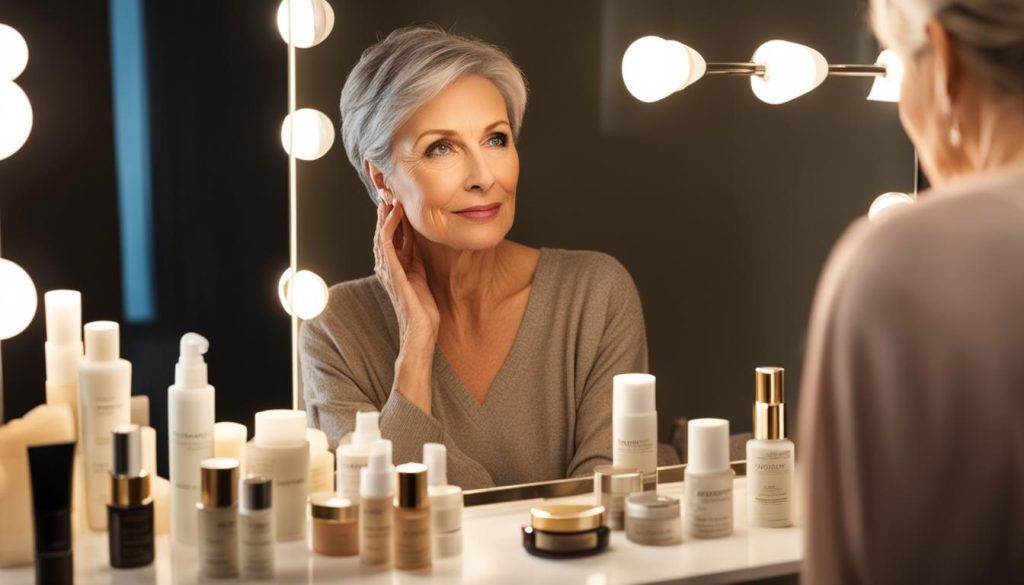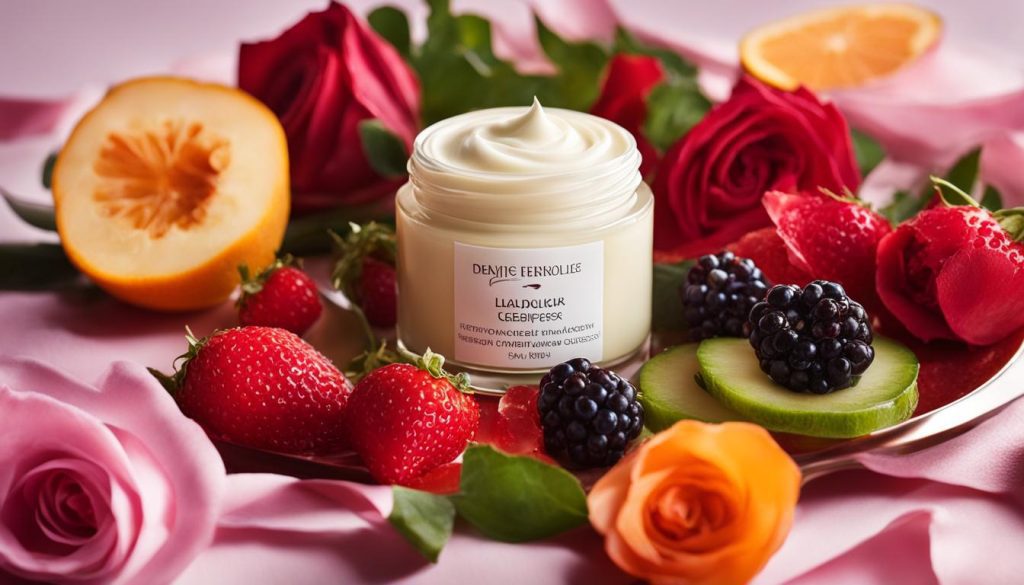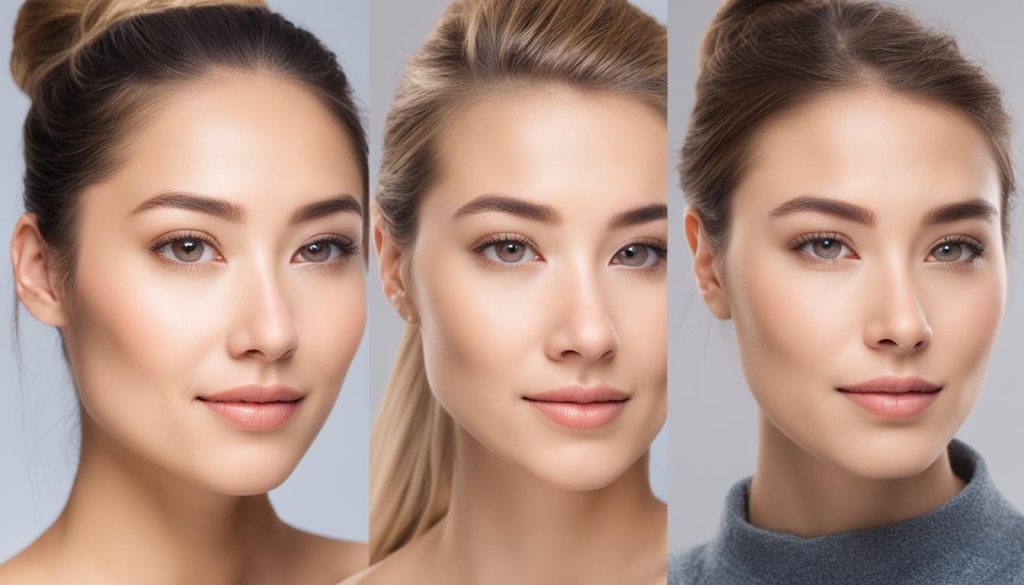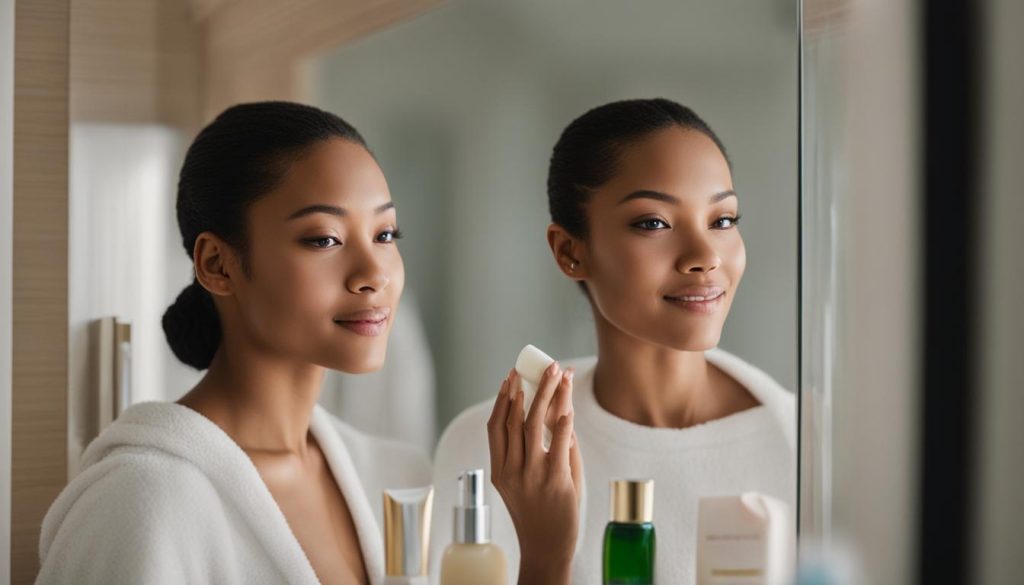As I venture through the transformative years of menopause, I’ve come to understand the unique challenges my skin faces. With hormonal changes rewriting the rules of skincare, I’ve learned that my regimen requires a major overhaul. It’s no longer just about looking youthful; it’s about nourishing my skin in a way that addresses the specific needs brought on by this natural stage of life. My connection with my complexion deepens as I seek out the best skin care for menopause, understanding that skin care during menopause is less about combating aging and more about respecting my skin’s evolving needs.
Now, the focus shifts to hormonal skincare, involving targeted treatments that maintain hydration, elasticity, and even skin tone, countering the tale that menopause spells the end of radiance and resilience. Curating a skincare menopause routine has become critical, and in doing so, I acknowledge the importance of sourcing products specifically formulated for skin care for menopausal skin, with brands offering valuable education on how to sustain skin’s health amid these changes.
Steering clear of generic solutions, my purpose is clear – to navigate skincare after menopause with grace, armed with knowledge and superior products that alleviate the transitions of this life phase. I embrace the skin care in menopause movement, which is more about empowerment and less about erasing the marks of a life well-lived.
Skin Care in Menopause
- Understanding the specific needs of skin care in menopause is crucial.
- Hormonal changes require a shift in skincare focus towards health and function.
- Strategic hydration and collagen support are vital for menopausal skin care.
- Educational resources from brands can guide best skin care for menopause choices.
- Quality products can help address hyperpigmentation and elasticity concerns.
- Menopause is an empowering stage that can be embraced with the right skincare menopause products.
Understanding Menopausal Skin Care Needs
When I enter the transformative years of menopause, I recognize that my body, particularly my skin, undergoes profound changes. This phase is pivotal in deciding how well I age, highlighting the importance of selecting the best skincare products for menopause that cater to the specific needs of my transitioning skin.

Decreased Collagen and Its Effects on Skin
The hallmark of menopausal skin is the steep decline in collagen production due to reduced estrogen levels. It’s a daunting figure—close to a 30% loss—which can leave my skin feeling drier, less elastic, with wrinkles that are more pronounced than ever. Appreciating the full scope of these menopausal skin issues reinforces my determination to follow a menopausal skincare routine that’s both structured and supportive, ensuring my skin remains as resilient and vibrant as my spirit.
Embracing the Change with Tailored Skin Products
As I search for hormonal skincare solutions, I discover brands like Pause Well-Aging, which offer a beacon of hope with their clinically tested formulas. Expertly designed for menopausal skin, they reaffirm my belief in using specific, anti-aging skincare for menopause. These products are more than just jars and bottles; they are an acknowledgment of my journey, providing me with a sense of empowerment as I navigate the natural changes of my body.
Debunking Myths Around Menopause and Skin Health
- Choosing natural skincare for menopause that aligns with my evolving ethical and health-oriented perspectives.
- Challenging outdated misconceptions and affirming that menopause does not dictate a diminished quality of life.
- Adopting a positive standpoint, advocating for comprehensive skincare education and solutions designed for menopausal skin.
Together, these steps enable me to address the unique needs of my skin during menopause with confidence and self-compassion.
The Importance of Hydration and Menopausal Skin Care
As I’ve navigated through menopause, I’ve come to realize that maintaining healthy skin requires a shift in focus towards deep hydration. Hormonal changes during menopause can make the skin drier and less elastic, but by embracing a tailored skincare routine for menopausal women, it’s possible to keep skin looking and feeling its best. And it all starts with understanding the key ingredients that can quench thirsty skin.
Identifying Hydrating Ingredients
In my quest for the best moisturizer for menopausal skin, I’ve learned to look for products that contain ingredients known for their intense hydrating properties. Ingredients such as glycerin and hyaluronic acid stand out for their ability to draw moisture into the skin and lock it in place. Additionally, natural oils and butter can provide a protective barrier that helps prevent water loss, keeping skin supple and soft.
Hyaluronic Acid’s Role in Menopausal Skin
Hyaluronic acid, a naturally occurring substance in the body, has a remarkable ability to hold up to a thousand times its weight in water. This makes it an essential component in my skincare routine for menopausal women, serving as a hydration powerhouse that can help to plump up the skin and smooth out fine lines.
Choosing the Right Cleansers and Moisturizers
Finding a cleanser that hydrates without stripping my skin was crucial. I discovered that products like the CeraVe Hydrating Facial Cleanser could do just that, thanks to its ceramide-rich formula. When it comes to moisturizers, consistency is key. Lighter lotions may suffice in your younger years, but menopausal skin often benefits from the richer, more emollient textures found in creams and balms that are formulated to combat dryness and loss of firmness.
- Seeking out products with ceramides to support the skin’s natural barrier.
- Incorporating oils rich in omega fatty acids for their nourishing effects.
- Choosing a moisturizer that’s been designed with menopausal skin in mind, for day and night application.
By making these mindful selections in my skincare products, I’ve noticed a significant improvement in my skin’s texture and overall appearance, maintaining its vitality even as I embrace the natural process of aging.

Tackling Menopausal Dryness and Loss of Elasticity
As I navigate through the transitional period of menopause, the impact of hormonal changes on my skin is unmistakable. With the decline in estrogen, I’ve noticed a marked increase in dryness and a reduction in skin elasticity. To address these menopausal skin care concerns, I’ve turned to a regimen specifically designed to nurture and restore my skin’s balance.
- Enhanced Hydration: Integrating hyaluronic acid into my daily skincare routine has been a game-changer for managing menopausal skin. Known for its ability to hold up to 1000 times its weight in water, hyaluronic acid helps to quench my skin’s thirst from within.
- Collagen Production: To combat the decreased elasticity, I’ve been consistent in using products that contain peptides and retinol. These powerhouse ingredients are renowned for their ability to support and boost natural collagen production, countering sagging and fine lines.
- Strengthening the Skin Barrier: I’ve discovered the importance of ceramides in maintaining a healthy skin barrier. By incorporating products like Emepelle Eye Cream, my skin feels more resilient and better protected against environmental stressors.
- Targeted Treatments: In addition to my overall skincare strategy, I use serums that deliver a concentrated dose of active ingredients. One of my favorites is the Dr. Loretta Intense Replenishing Serum, which is formulated with peptides specifically to rejuvenate menopausal skin.
While hormonal changes and skincare challenges often go hand-in-hand during menopause, I’m learning that with the right care and targeted products, maintaining a radiant and supple complexion is absolutely within reach.
Skin Care in Menopause: Addressing Hyperpigmentation
As I’ve journeyed through the stages of menopause, my resolve to maintain radiant skin health has led to a deep dive into targeted solutions for hyperpigmentation. Those ever-present hormonal changes do more than just heat things up; they can also leave their mark in the form of dark spots and uneven skin tones. I’ve learned that being proactive with specific skincare tips for menopause can make all the difference in managing skin concerns during menopause.
Vitamin C and Topical Antioxidants for Brightening
In quelling the battle with blotches and uneven skin tone, I’ve discovered that the brightening power of Vitamin C is unmatched. I’ve personally witnessed an improvement in the clarity of my skin since incorporating the Marie Veronique Vitamins C+E+Ferulic Serum into my regime. Not only does Vitamin C help to lighten those pesky dark spots, but it’s also a catalyst for collagen production, which is crucial for firm, resilient skin.
Natural Remedies and Creams to Even Skin Tone
The quest for even skin tone doesn’t stop at Vitamin C. I’ve also turned to the earth’s bounty for natural remedies, and there’s an array of creams that promise to even skin tone. Each product feels like a step toward reclaiming my skin’s uniformity. Embracing menopause skincare tips and nurturing my complexion with respect to these natural elements has become an empowering ritual.
Protecting Against Sun Damage with SPF
No strategy for maintaining skin health during menopause would be complete without a shield against the sun. Daily use of SPF, specifically those fortified with non-nano zinc oxide, provides my skin with a guard against both UVA and UVB rays, crucial for keeping hyperpigmentation in check. It’s about protecting as much as it is about correcting, fortifying my skin against future damage while remedying the past.
FAQ
What are the key concerns for skin care in menopause?
During menopause, the key skin concerns are dryness, decreased elasticity, loss of collagen, deepening of wrinkles, and hyperpigmentation. The hormonal changes, particularly the reduction in estrogen levels, contribute significantly to these concerns, leading to a need for more specialized skincare.
How does decreased collagen affect menopausal skin?
Decreased collagen production, resulting from reduced estrogen levels, causes the skin to become thinner and less elastic, leading to sagging, and an increase in the visibility of lines and wrinkles. In facial skin, this results in approximately a 30% loss of collagen during menopause.
Can the right skin products really make a difference during menopause?
Absolutely. Tailored skin products, like those from Pause Well-Aging, are specifically formulated to address the hormonal changes experienced during menopause. These products tend to focus on hydration, elasticity, and addressing concerns like hyperpigmentation and are often more effective than non-specialized products.
Are there myths about menopause that affect how we approach skin health?
Yes, one common myth is that menopause inevitably leads to a decline in the quality of life and appearance. Instead, experts encourage a positive and proactive approach to menopause skincare, focusing on health and function rather than solely on anti-aging.
What ingredients should I look for in hydrating products for menopausal skin?
Ingredients like hyaluronic acid, glycerin, and ceramides are vital for menopausal skin as they help retain moisture and reinforce the skin’s barrier. For instance, products like CeraVe Hydrating Facial Cleanser offer a great blend of these ingredients for optimal skin hydration.
How does hyaluronic acid benefit menopausal skin?
Hyaluronic acid is known for its capacity to retain a significant amount of water, which can be particularly beneficial for menopausal skin that often struggles with dryness. It helps to keep skin hydrated, plump, and less likely to show fine lines.
What types of cleansers and moisturizers are best for menopausal skin?
The best cleansers and moisturizers for menopausal skin are those that provide hydration without stripping the skin’s natural oils. Look for products rich in ceramides and hydrating ingredients, and avoid those with harsh detergents or alcohol that can exacerbate dryness.
What can I do about the dryness and loss of elasticity in menopausal skin?
To tackle dryness and improve elasticity, turn to products that promote collagen production, such as peptides and retinol. In addition, ensure continuous hydration with products containing hyaluronic acid and ceramides. Emepelle Eye Cream and Dr. Loretta Intense Replenishing Serum are excellent examples that effectively address these concerns.
How should I deal with hyperpigmentation during menopause?
For handling hyperpigmentation, incorporate topical antioxidants like vitamin C into your routine, which can help brighten the skin and diminish the appearance of dark spots. Marie Veronique Vitamins C+E+Ferulic Serum is one such product that can help manage hyperpigmentation while also stimulating collagen production.
Why is sun protection essential in menopausal skincare, and how does it help with hyperpigmentation?
Sun protection is crucial in menopausal skincare because the skin becomes more susceptible to damage from UV rays, which can exacerbate hyperpigmentation and contribute to further loss of elasticity. Using a broad-spectrum sunscreen daily, especially those with non-nano zinc oxide, helps protect the skin against these effects and supports overall skin health.
Are there natural remedies and creams effective for evening out skin tone during menopause?
Yes, there are natural remedies and creams that may help even out skin tone. Ingredients like niacinamide, liquorice extract, and soy have properties that can improve hyperpigmentation. However, it’s essential to choose products formulated for menopausal skin, as they are designed to combat the unique challenges of this life stage.






